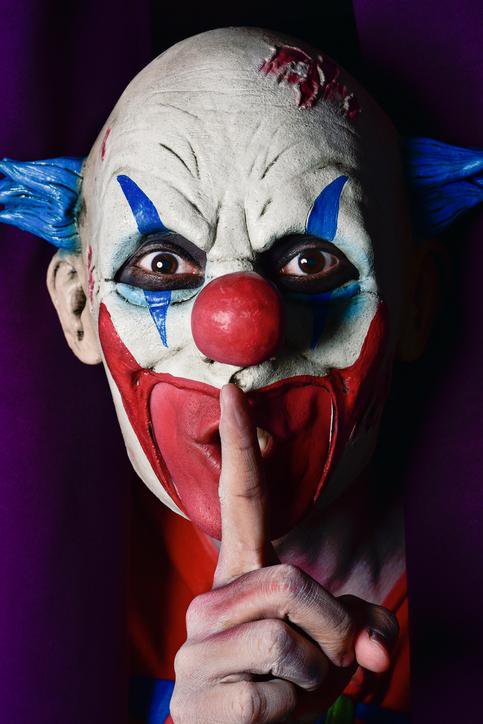Halloween Heads-Up: Clowns Haven’t Always Been Scary

The death of the man behind the iconic Bozo the Clown, Frank Avruch, earlier this year resurrected mixed feelings about this character worldwide. On the one hand, many people have fond memories, remembering his show which entertained legions of children for decades. For others – spurred by the near-simultaneous release of Stephen King’s blockbuster IT – all things clown seem evil and sinister.
So when did clowns cross over from goofy to grotesque? The scary-clown connoisseurs here at The Horror Dome weigh in.
“Terrifying” Clowns in History
Clowns are believed to originate in England, where they served as comic relief from the heart-pounding thrill of the daring circus acts. Their humor became broader; as clowns had more space to fill between acts, their movements and actions became more over-exaggerated. Clowning became tinged with dark undertones: French literary critic Edmond de Goncourt, writing in 1876, says, “[T]he clown’s art is now rather terrifying and full of anxiety and apprehension, their suicidal feats, their monstrous gesticulations and frenzied mimicry reminding one of the courtyard of a lunatic asylum.”

The clown tradition crossed the Atlantic from to America, and in the late 1800's the circus exploded in popularity, expanding from one ring with a horse act to the three-ring touring spectacle we know today. While locations changed, the figure of the sad clown remained a fixture. Emmett Kelly was the most well-known “hobo” clown in the United States, and his “Weary Willie” stemmed from real-life tragedy of his divorce and the Great Depression.
Clowns had a resurgence in America with the popularity of television, which ushered in children’s entertainers like Bozo, Clarabell the Clown, Howdy Doody’s silent companion. In 1963, McDonald’s rolled out the jolly Ronald McDonald and he’s been at the forefront of the fast-food chain's brand ever since.
At this point clowns became known almost exclusively as children’s entertainers, and this expectation of goodness invited suspicions about their ulterior motives and what might be lurking underneath the face paint.
In a 2013 interview with Smithsonian magazine, author Andrew McConnell Stott explains: “Where there is mystery, it’s supposed there must be evil, so we think, ‘What are you hiding?’”
“We Need Both Bad and Good Clowns”

David Carlyon, a former clown with Ringling Bros. and Barnum & Bailey Circus and now a writer, believes that the fear of clowns — formally known as coulrophobia — is more of a recent development, arising alongside the counter-culture in the 1960s and becoming a cultural staple in the 1980s.
“There is no ancient fear of clowns,” he said. “It wasn’t like there was this panic rippling through Madison Square Garden as I walked up through the seats. Not at all.”
Benjamin Radford, author of the book “Bad Clowns”, does see a deeper historical root to the fear of clowns.
“It’s a mistake to ask when clowns turned bad because historically they were never really good," says Radford. "They’ve always had this deeply ambiguous character.”
Radford tracks a line of morally ambiguous clowns from ancient Greece to court jesters in the Middle Ages and Harlequins during the Renaissance. He points out that the much-loved Punch clown puppet in Britain, first emerging on the scene in the 16th century, beats his wife Judy with a club and is known for having a murderous bent.
Though opinions differ on the origin of evil clowns, Radford suggests that fun-loving clowns like Bozo, who just want to entertain and bring joy to people, are necessary to provide contrast to the evil clowns, and vice versa -- the good and the bad help to define each other.
Happy, Sad, Evil – Take Your Pick
The HorrorDome.com has quickly become one the leading online retailers in the haunted house and Halloween products industry. We carry an extensive range of products, including our unique lines of Halloween costumes, props, masks, and Animatronics. If you are in the market for a clown costume this Halloween or any time of the year, we have a wide variety from which to choose. Call or email us with any questions!
Additional resources on the scary clown phenomena:
- People.com, “Why are People So Scared of Clowns?”
https://people.com/movies/why-are-people-scared-of-clowns-the-surprising-scientific-reason-its-not-stephen-kings-fault/ - Business Insider, “Why People are Afraid of Clowns Explained,”
https://www.businessinsider.com/why-people-afraid-clowns-phobia-coulrophobia-it-movie-2017-9




Leave a comment